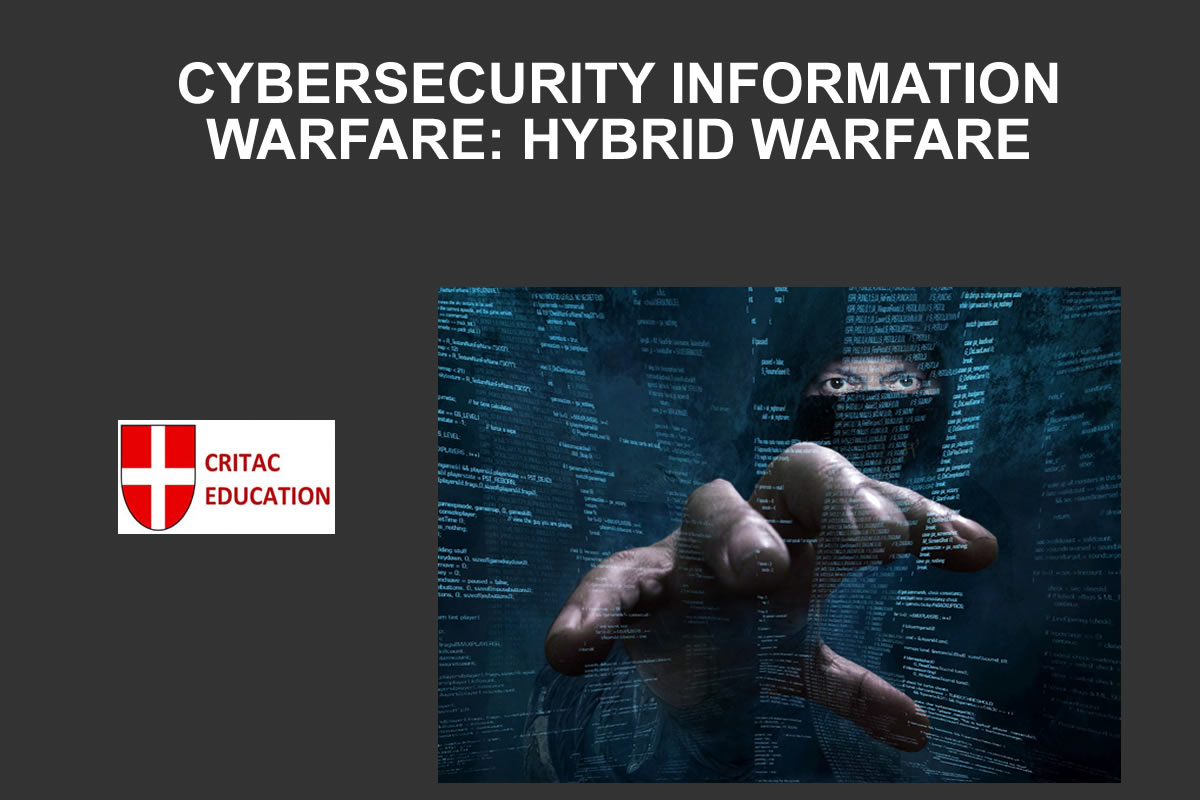Embark on an in-depth journey into the confluence of cybersecurity and hybrid warfare, unraveling the historical context, strategic significance, and contemporary challenges in this complex intersection. This comprehensive course spans 25 modules, providing a thorough exploration of key concepts, case studies, and strategies.
Course Highlights:
-
Defining the Intersection of Cybersecurity and Hybrid Warfare:
- Explore the intertwined nature of cybersecurity and hybrid warfare.
- Delve into the historical context and the strategic significance of their convergence.
-
Understanding Hybrid Warfare:
- Define the nature of hybrid warfare, examining historical examples and the spectrum of hybrid conflict.
- Uncover the role of state and non-state actors, geopolitical contexts, and objectives.
-
The Digital Evolution of Hybrid Warfare:
- Investigate the impact of technology on modern hybrid warfare.
- Examine cyber capabilities and information warfare tactics, using the annexation of Crimea as a compelling case study.
-
The Elements of Hybrid Warfare:
- Identify the components of hybrid warfare, exploring both state and non-state actors.
- Analyze geopolitical contexts and objectives, drawing insights from the conflict in Eastern Ukraine.
-
Psychological Aspects of Hybrid Warfare:
- Examine the psychological dimensions of influence and manipulation in hybrid warfare.
- Explore cognitive biases, human vulnerabilities, and the role of psychological operations, illustrated through the Syrian conflict and propaganda.
-
Cyber Espionage in Hybrid Warfare:
- Analyze the role of cyber espionage in hybrid operations.
- Delve into case studies of nation-state and non-state actors engaging in cyber espionage.
-
Information Warfare and Influence Operations:
- Explore influence operations in political and social contexts.
- Investigate manipulative tactics employed in information warfare, with a focus on the Russia-Ukraine conflict.
-
Disinformation and Misinformation in Hybrid Warfare:
- Assess the role of false information in hybrid warfare.
- Examine media manipulation, the spread of misinformation, and their impact on public perception, using the Syrian Civil War as a case study.
-
Detecting and Countering Hybrid Warfare:
- Acquire techniques and tools for identifying hybrid warfare efforts.
- Explore national and international responses, along with strategies for defense and resilience, illustrated through the Baltic States' response to Russian hybrid tactics.
-
Legal and Ethical Considerations:
- Navigate ethical dilemmas in countering hybrid warfare.
- Assess legal frameworks, international agreements, and the delicate balance between security and freedom of expression.
-
Case Studies - Historical Examples of Hybrid Warfare:
- Analyze notable incidents from the past, drawing lessons and implications for modern hybrid threats.
-
Case Studies - Contemporary Examples of Hybrid Warfare:
- Examine recent and ongoing hybrid warfare campaigns, understanding their impact on global affairs and international relations.
-
The Role of Cybersecurity in Hybrid Warfare:
- Explore the intersection of cybersecurity and hybrid warfare.
- Assess vulnerabilities, attack vectors, and best practices in cybersecurity, with a focus on the NotPetya cyberattack.
-
Hybrid Warfare and Critical Infrastructure:
- Evaluate the targeting of critical infrastructure in hybrid warfare.
- Examine implications for national security, public safety, and strategies to protect critical systems, using the Stuxnet cyberattack as a case study.
-
Influence Operations and Public Health and Safety:
- Analyze the impact of influence operations on public health and safety.
- Examine the role of disinformation in health threats and safeguarding public well-being during the COVID-19 infodemic.
-
Media Literacy and Education in Resilience:
- Promote media literacy as a defense against hybrid warfare.
- Explore educational initiatives and programs fostering critical thinking skills, illustrated by a case study on misinformation in the 2016 U.S. presidential election.
-
The Role of Artificial Intelligence in Hybrid Warfare:
- Investigate the role of AI in hybrid warfare, focusing on detection and prevention.
- Delve into ethical considerations surrounding AI's role, using autonomous weapons and ethical concerns as a case study.
-
Global Perspectives on Countering Hybrid Warfare:
- Examine strategies for countering hybrid warfare in different cultural and political contexts.
- Explore international collaborative efforts, diplomacy, challenges, and opportunities, including interference in democratic processes.
-
Building Resilience in the Age of Hybrid Warfare:
- Develop strategies for enhanced resilience, preparedness, and response to hybrid threats.
- Explore case studies, such as Estonia's response to the 2007 cyber-attacks, showcasing resilient societies and institutions.
-
Technology and Hybrid Warfare Resilience:
- Leverage technology to enhance resilience against hybrid warfare.
- Address challenges in securing information technology and explore innovations, using Israel's Iron Dome defense system as a case study.
-
Legal Frameworks for Countering Hybrid Warfare:
- Examine international agreements, legal measures, and responses to hybrid warfare threats.
- Analyze the role of international organizations and legal frameworks, illustrated by Russia's annexation of Crimea.
-
National Security and Hybrid Warfare:
- Recognize hybrid warfare as a national security concern.
- Explore implications for defense and intelligence agencies, safeguarding national interests and security, with a case study on the conflict in Syria.
-
Diplomacy and Hybrid Warfare:
- Assess the role of diplomacy in countering hybrid warfare.
- Explore international collaborative efforts in diplomacy and diplomatic initiatives for hybrid warfare resilience, exemplified by the European Union's response to disinformation.
-
Hybrid Warfare in International Relations:
- Analyze hybrid warfare's impact on diplomacy and international relations.
- Examine counter-strategies in international contexts, considering challenges and opportunities, using Russia's hybrid warfare in Ukraine as a case study.
-
Conclusion and Recommendations:
- Summarize key takeaways from the course, offering policy and practical recommendations.
- Reflect on the ongoing battle against hybrid warfare in the age of cybersecurity and global conflict.
Who this course is for: Professionals in cybersecurity, defense, intelligence, diplomacy, and individuals seeking a comprehensive understanding of the complex dynamics at the intersection of cybersecurity and hybrid warfare.
Embark on this intellectually stimulating journey to grasp the intricacies of cybersecurity information warfare and hybrid warfare, contributing to a resilient and secure global landscape.
